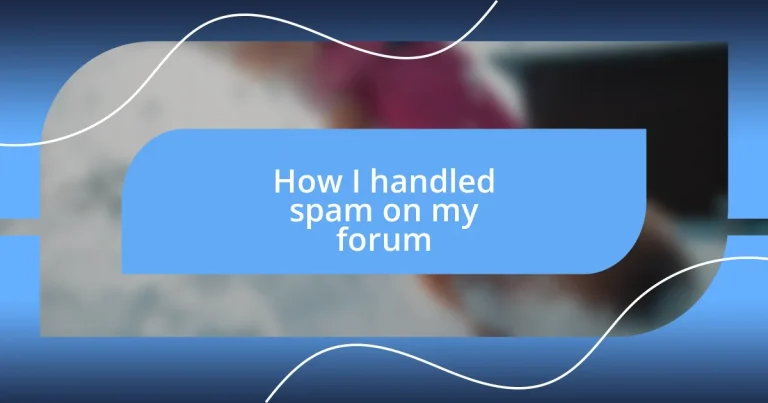Key takeaways:
- Implementing effective spam filters and community moderation systems significantly reduced spam traffic and engaged users in maintaining forum quality.
- Introducing CAPTCHA during registration helped deter bots, leading to a more genuine community and improved interactions among members.
- Regularly reviewing and adapting anti-spam strategies, along with fostering open communication among moderators and users, enhances the forum’s resilience against evolving spam tactics.
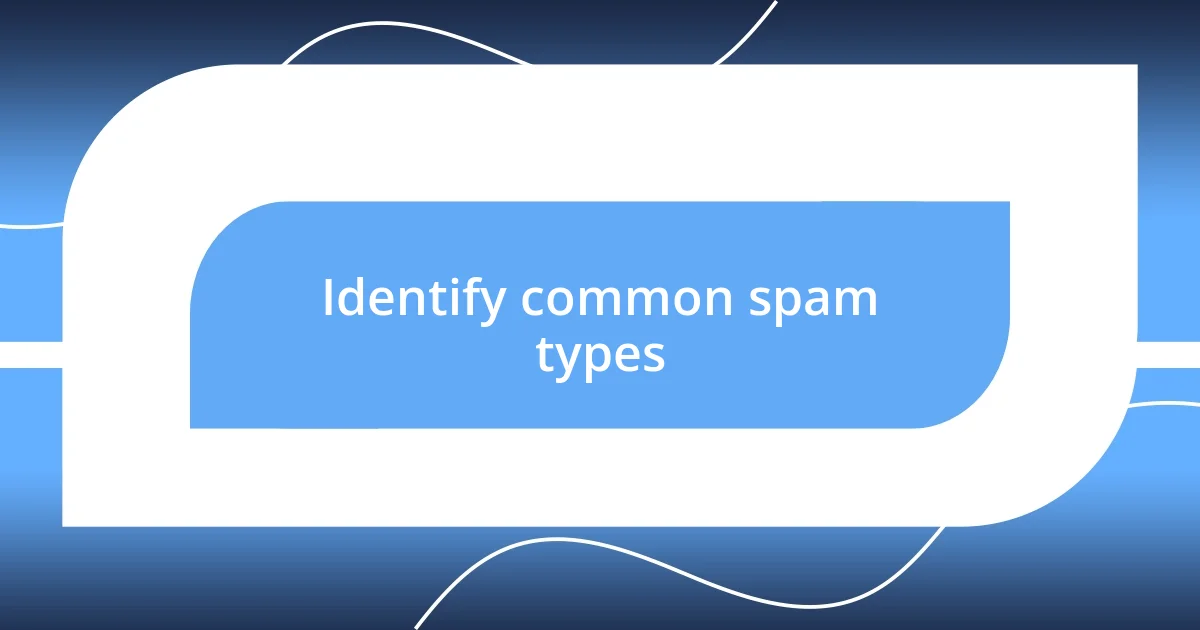
Identify common spam types
One of the most common types of spam I encountered on my forum is the infamous link spam. These are those posts that offer questionable websites or products, often promising miracle solutions or incredible deals. I remember feeling a mix of frustration and disbelief when I first saw a post claiming to sell “authentic moon rocks”—who would actually fall for that?
Another prevalent type includes comment spam, which usually consists of irrelevant content that’s just a means to promote a user’s own website. I recall a situation where someone replied to a heartfelt discussion about mental health with a vague comment like, “Great point! Check out my blog for tips!” It made me wonder about the lack of empathy in such spamming. Doesn’t it feel disheartening when genuine conversations are derailed for personal gain?
Then there’s the bot-generated spam, often filled with jumbled words and random numbers. I once spent an afternoon cleaning up after a bot that posted hundreds of gibberish replies in just a few hours. It left me questioning how something so mindless could waste so much of my time. Have you ever felt like these spammy intrusions sucked the life out of your community? It’s a challenge that truly tests a forum administrator’s patience.
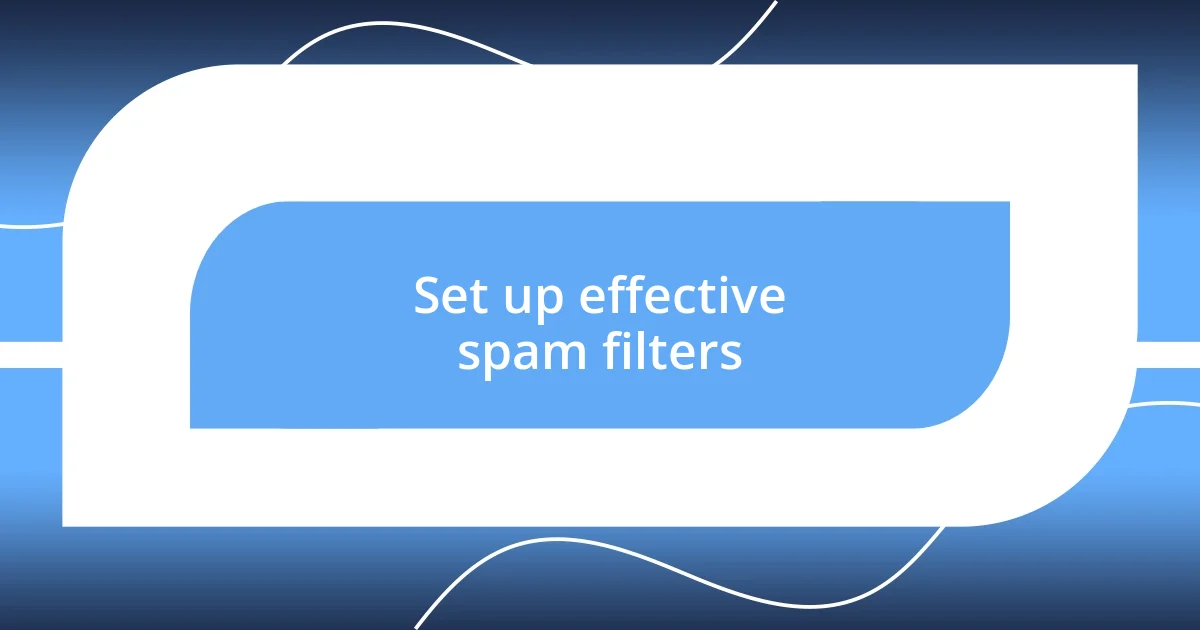
Set up effective spam filters
Setting up effective spam filters is crucial for maintaining the quality of discussions on your forum. My experience taught me how a well-configured filter can significantly reduce the need for constant moderation. When I implemented filters that blocked certain keywords and flagged suspicious IP addresses, I saw an immediate drop in spam traffic. It’s almost like finding a hidden switch that lit up my forum anew.
I recommend conducting regular filter updates based on the evolving spam landscape. After I discovered specific patterns in the spam posts, I was able to fine-tune my filters to catch emerging threats. For instance, I discovered that common terms used in spam posts often changed with trends. Taking the time to adjust my filters not only kept my community safe but also provided a sense of control over the environment I was nurturing.
One of my most effective strategies was creating a community moderation system. By allowing trusted members to flag suspicious content, it placed some of the responsibility in the hands of my users. This not only engaged them more deeply but also quickly alerted me to problem areas I might have missed. The feedback was overwhelmingly positive, as members felt more empowered in curating the forum’s content themselves.
| Filter Type | Description |
|---|---|
| Keyword Filters | Blocks posts containing specific spam-related words or phrases. |
| IP Address Blocking | Prevents certain IPs known for sending spam from posting. |
| Community Moderation | Allows users to flag and report spam, enhancing collective vigilance. |
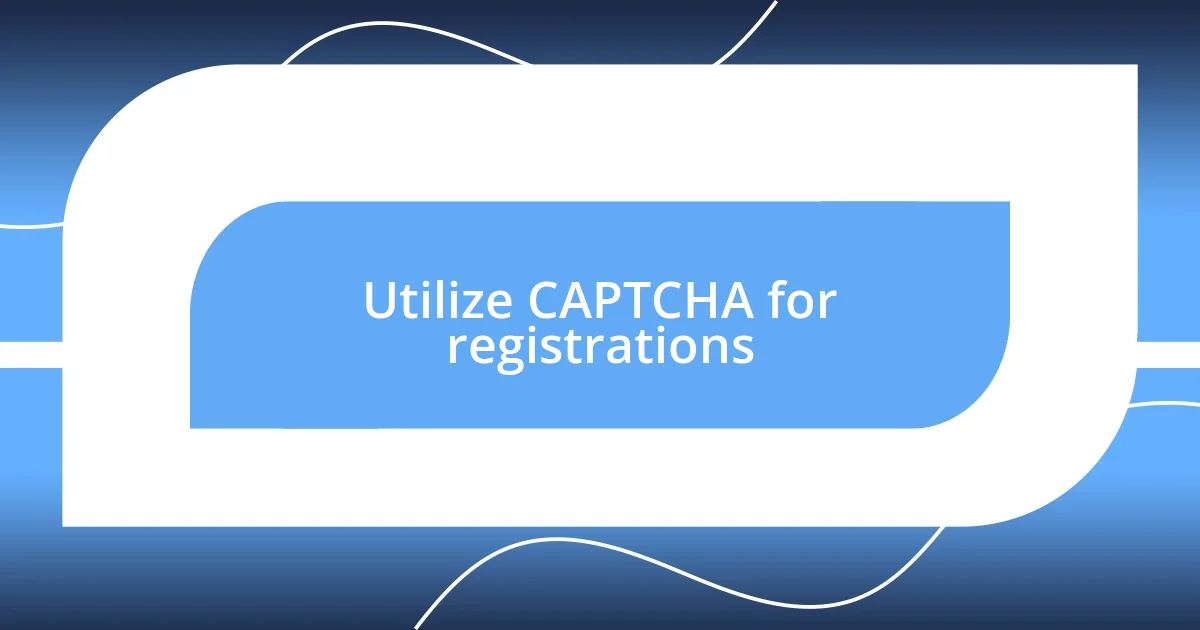
Utilize CAPTCHA for registrations
When I first faced the flood of spam registrations on my forum, adding CAPTCHA was a game-changer. Implementing CAPTCHA during the registration process effectively discouraged many bots from infiltrating my community. I vividly recall the moment it clicked—after introducing it, the number of suspicious sign-ups dropped drastically. It felt like a breath of fresh air, knowing I had taken a crucial step in protecting my space.
Here’s a quick rundown of how CAPTCHA can bolster your registration process:
- Bot Deterrent: CAPTCHA filters out automated bots, ensuring that real users are signing up.
- Simple Yet Effective: Modern CAPTCHAs are user-friendly, often just requiring a click or image selection.
- Customizable Options: You can choose different types, like reCAPTCHA or image-based challenges, tailored to your audience’s tech-savviness.
- Improved Engagement: With fewer spam registrations, you foster a more genuine community atmosphere, enhancing interactions and trust among members.
Choosing the right type of CAPTCHA suited my forum’s needs made all the difference, and I honestly felt relieved to finally have a handle on the situation.
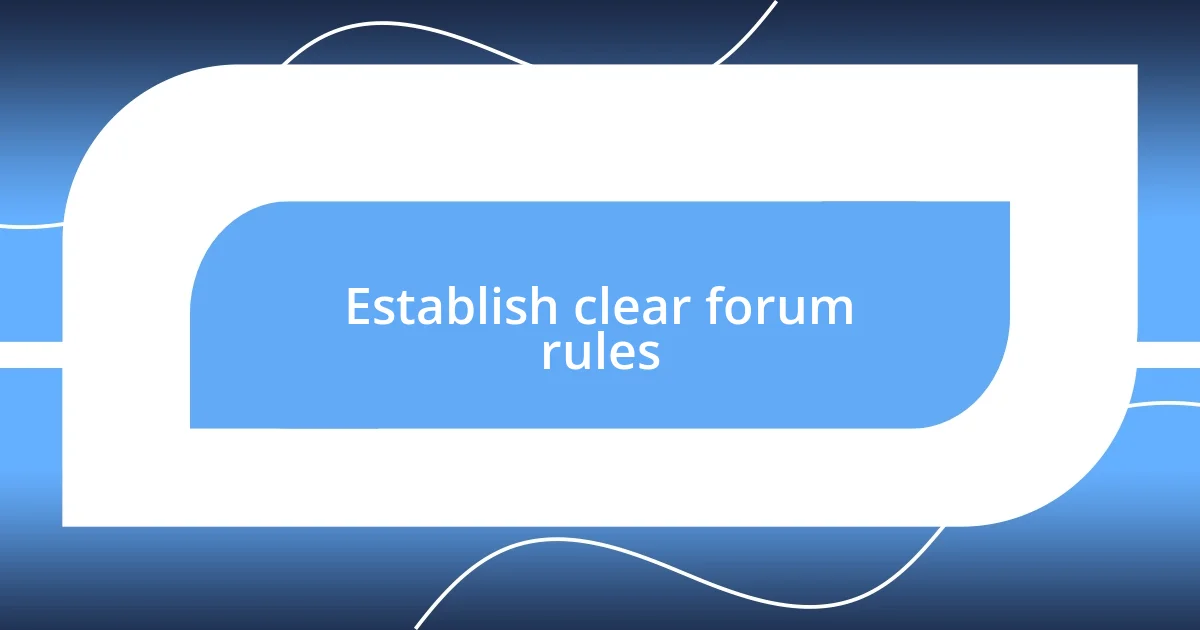
Establish clear forum rules
Establishing clear rules for my forum was one of the best decisions I ever made. I remember the initial chaos when new users would join and post anything without a second thought. By setting clear guidelines, I laid the groundwork for a respectful and engaging community. How could I expect my members to behave if the boundaries weren’t explicitly defined?
The process of drafting these rules was both eye-opening and essential. I included specifics about what constituted acceptable content and behavior, which helped eliminate misunderstandings. As I rolled out these new guidelines, I noticed a significant shift in the interactions; discussions became more constructive, and the overall tone of the forum improved. It felt rewarding to witness my community members taking pride in adhering to the standards we collectively agreed upon.
To ensure that everyone was on the same page, I made the rules easily accessible and highlighted them in prominent areas. This transparency fostered a sense of accountability, encouraging users to self-moderate. I even started having a “Rules Reminder” feature periodically pop up for newcomers, which they found helpful. Reflecting on this, I realized that when everyone understands the expectations, it creates a safer and more inviting environment for meaningful discourse.
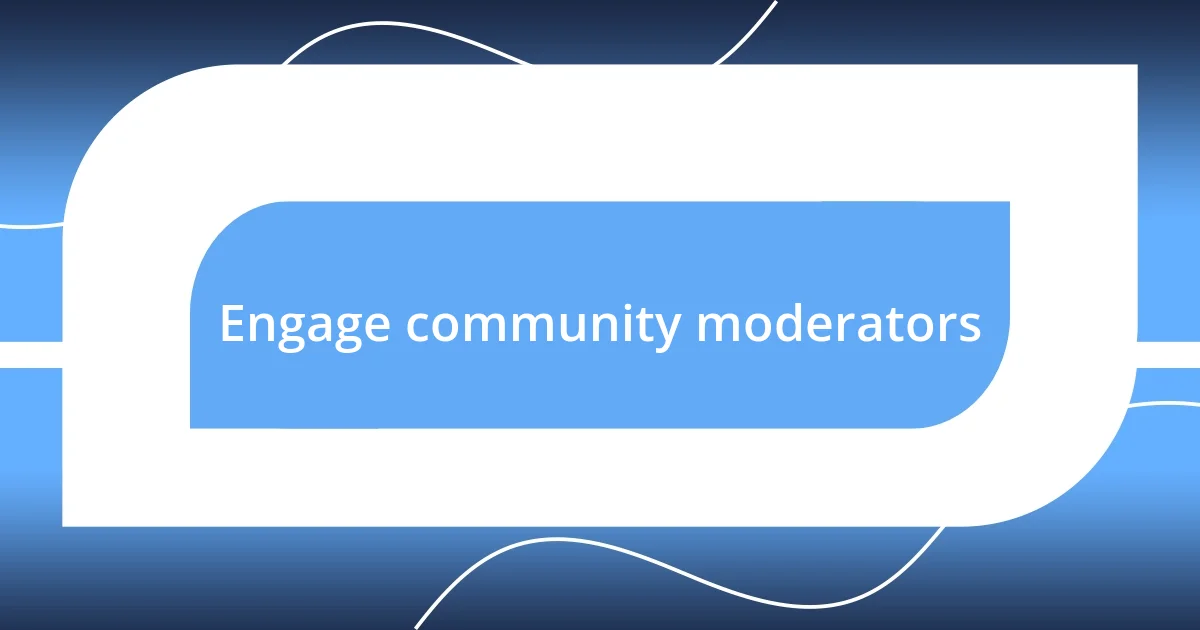
Engage community moderators
Engaging community moderators is essential for maintaining a spam-free forum. I remember when I first brought moderators on board; it felt like a pivotal moment. These dedicated individuals not only helped monitor content but also provided valuable feedback on the ongoing challenges we faced. Their presence gave me peace of mind, knowing that there were eyes on the ground to catch any spammy behavior before it escalated.
I found that choosing the right moderators was equally important. I made sure to select members who were not only active but also genuinely cared about the community. They felt a sense of ownership and responsibility towards our forum. I often remind myself of the early days when a new moderator stepped in to handle a surge of spam. The speed and efficiency with which they managed the situation impressed everyone, creating a solid foundation of trust within our team. Have you ever seen how a dedicated group can transform a space? I know I have—it’s like watching a well-oiled machine come to life.
Regular check-ins with the moderators fostered an open dialogue about spam occurrences. We’d talk through strategies and share successes, which helped boost morale. I vividly recall one session where we collectively brainstormed additional spam-fighting tactics; the energy was infectious, and we left it feeling empowered. It’s moments like these that cemented the idea that bringing in moderators wasn’t just about managing spam; it was about building a community of like-minded individuals who were invested in creating a great forum experience for everyone.
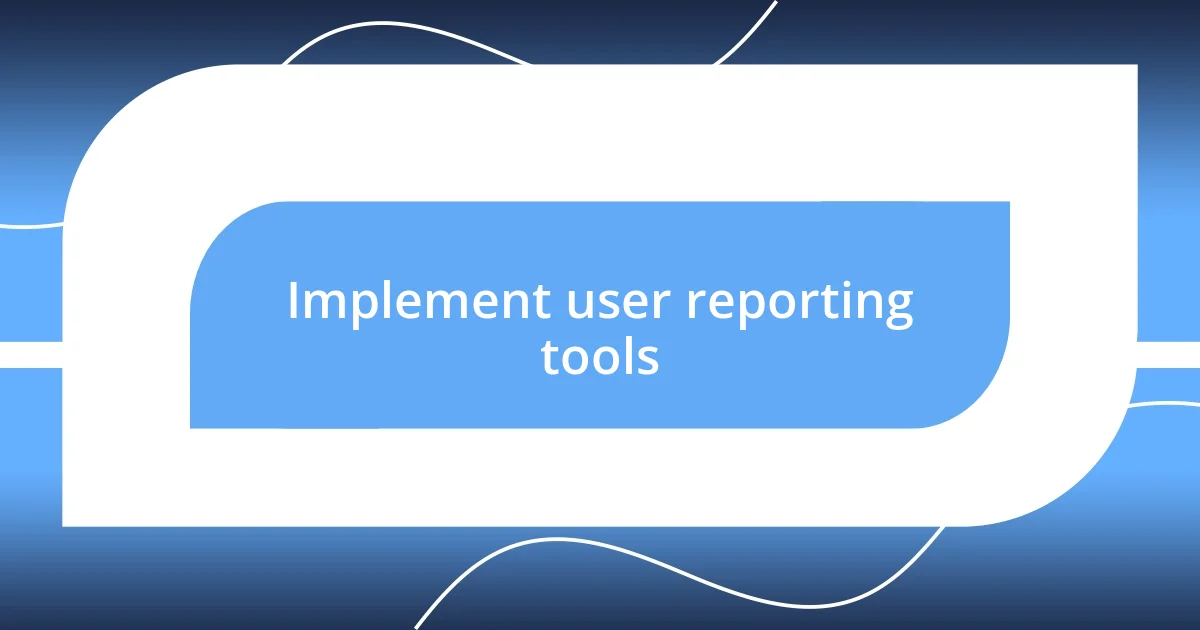
Implement user reporting tools
Implementing user reporting tools transformed how spam was managed on my forum. I vividly remember the relief I felt when I first introduced a reporting feature. It empowered users to flag inappropriate content directly, which not only eased my workload but also fostered a sense of community engagement. Have you ever noticed how members often know the pulse of the forum better than moderators? That was certainly my experience; users were quick to identify spammy posts and take action.
I made it a priority to ensure that the reporting tools were easily accessible and user-friendly. At first, I worried that some members would hesitate to report issues—not wanting to be seen as a “snitch.” But when I emphasized that reporting was about protecting the community, not shaming individuals, it opened up a floodgate of participation. I remember receiving a heartfelt note from a user who felt empowered because they could contribute to maintaining the forum’s integrity. It was a testament to how important it is to let users feel like they have a voice.
Moreover, I also implemented a follow-up process for reported content. Users appreciated knowing that their concerns were taken seriously. When I started sending out updates about the actions taken on reported posts, the trust within my community grew stronger. It was like watching a garden flourish; when users felt valued and heard, they became more invested in ensuring that the forum remained a safe space. How can we expect a community to thrive if members don’t feel they can trust one another? In my experience, strong communication and respect are the keys to a flourishing environment.
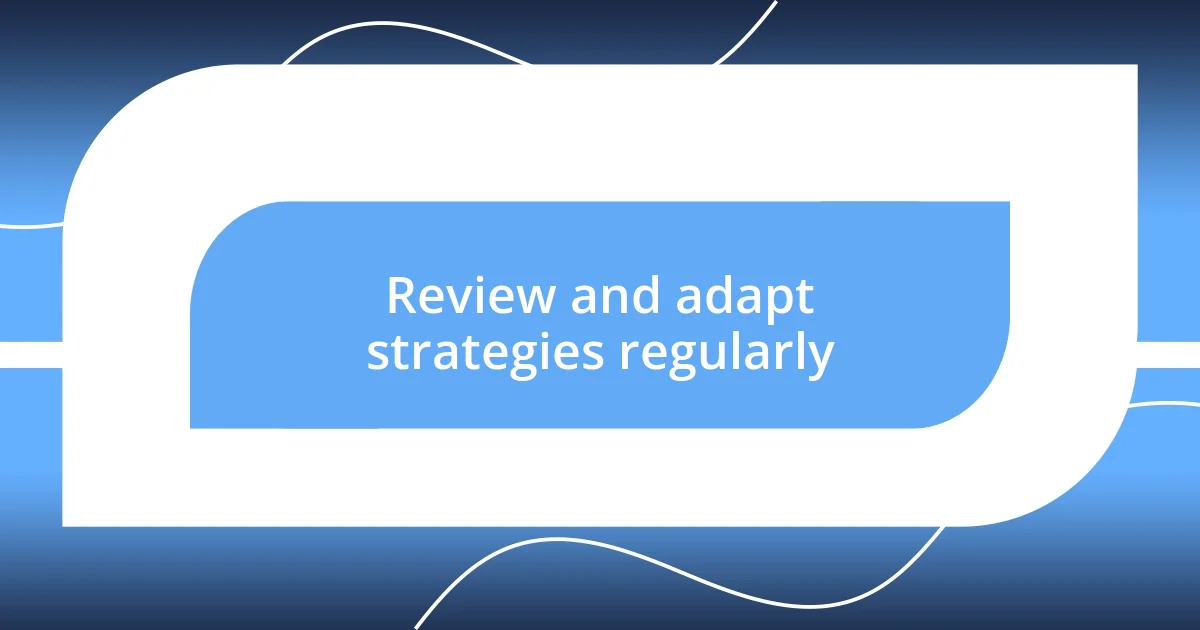
Review and adapt strategies regularly
Reviewing and adapting strategies regularly is key to staying ahead of the spam curve. I can’t stress enough how I learned this lesson the hard way. Initially, I set up our anti-spam measures and thought they would work indefinitely. However, as the forum evolved and spammers became more sophisticated, it became clear that I needed to reassess my approach frequently. Have you ever found yourself clinging to a method that used to work? It’s uncomfortable to realize that what was once effective could become outdated.
I remember a particular discussion where I gathered insights from both moderators and users about our existing spam policies. A moderator pointed out a new trend in spam that hadn’t been on my radar, which led me to adopt an agile mindset towards my strategies. The importance of flexibility truly hit home for me. I know that incorporating feedback not only strengthens our defenses but also cultivates a culture of continuous improvement within the community. This constant dialogue keeps everyone engaged and vigilant.
Another memorable moment was when I organized a quarterly review session focused solely on spam management. As we analyzed patterns and shared updated data, I felt a renewed energy among the team. It wasn’t just about addressing spam; it was about proactively preventing it. That day, I realized that being responsive to the changing landscape of spam can be incredibly empowering. Are we merely reacting to spam, or are we taking the lead to prevent it? I believe that by regularly evaluating our strategies, we’re building a stronger, more resilient forum where everyone plays a vital role in its upkeep.












